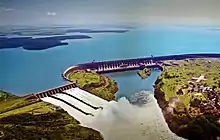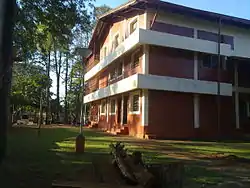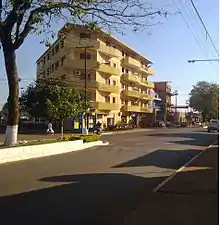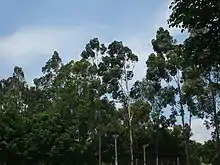Hernandarias is a district and city of the Alto Paraná Department. It is 349 km from Asunción, and is known as the "Latin American Capital of Electric Power". It had a population of about 80,000 in 2008.
Understand

There are two hydroelectric plants: Acaray which was launched in 1968 and Itaipú, built between 1976 and 1982. The latter produced the second most energy of any in the world as of 2020, after the Three Gorges Dam in China.
It is an agricultural area with palm exploitation, mint, maize, coffee, cotton, rice, beans, wheat and castor, also engaged in animal hunting, forestry and trade.
History
Hernandarias used to be called "Tacurú Pucu" ("Long antplace") after the of mounds of sand formed by ants scattered across the ground. It now bears this name in honor of Hernando Arias de Saavedra, the first native governor of the province of Giant Indies during the colonial era.
The former yerba capital, there was the huge factory yerba "Industrial Paraguaya". With the construction of dams, the development and growth of the region can be seen.
Climate
The average annual temperature is 21 °C, the highest reaches 38 °C and the minimum 0 °C. The highest annual amount of the country's rainfall occurs in the region of Alto Paraná Department. In winter are permanent dew and fog.
The town of Hernandarias is surrounded by the Acaray and Paraná Rivers.


Get in
This city is 15 km from Ciudad del Este, on Route II "Mcal. Estigarribia" until the viaduct in the 4 km; take the highway that leads to Saltos del Guairá.
Get around
See
- 🌍 Itaipú dam. The second largest hydroelectric power station in the world.
- Museum of the Earth Guarani is the first multimedia interactive museum of Paraguay, organized into two pavilions. The World Guarani where the culture and lifestyle of the ancient inhabitants of this region Guarani, its economy and history, and of people of 10,000 years ago. In the World of Science are animals living in the area.
- Museum of Natural History which takes samples from animals and plants in the area.
- Zoo Itaipu which houses animal species in an area of 12 hectares.
- Forest Nursery with samples of plants in the region, which are conducted annually nearly 200,000 pairs of more than 500 species of ornamental plants, fruit and forestry. Plants from the nursery are used for reforestation of degraded areas, landscaping throughout the entity or entities that request.
- Aquaculture station where are reared fish species, with laboratories, ponds, hatcheries and skilled human resources for the generation and transfer of technology. The main species that breed in the season are: pacú, karimbatá, gold, and surubí.

- Municipal Theatre has the capacity to house nearly a thousand people, for artistic performances, dance, theatre, choirs, etc.
- Walk Spain is an architectural complex within which the Departments of Culture, Tourism and Education of the Municipality of Hernandarias, are also the Library and Technology Park.
Do
- 🌍 Tatí Yupí Refuge. A recreational area on the shores of Lake River and Tatar Yup, where tourists can do photographic safari, guided tours and boat rides.
- Biological Reserve Itabo. Ecoregion in the Alto Paraná, 80 km from the town of Hernandarias, has an area of 13,807 ha of undulating topography. The river of the same name, Itabo, crosses the reservation from west to east with its two arms, North Itabo and Itabo South and some of its tributaries. The climate is subtropical in the region, with light rainfall, ranging from 1,500 to 1,700 mm. The plants of the reservation that predominates: Tabebuia sp., Peltophorum dubium, Cedrela fissilis among others.
Buy
Eat
Drink
Sleep
Stay safe
Go next
File:Itaipu Décembre 2007 - Vue Générale.jpg